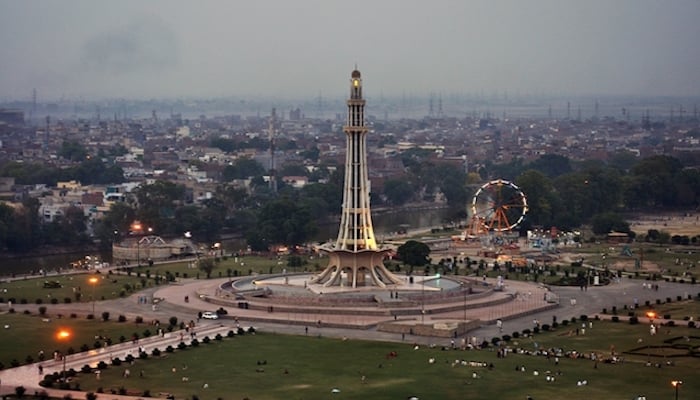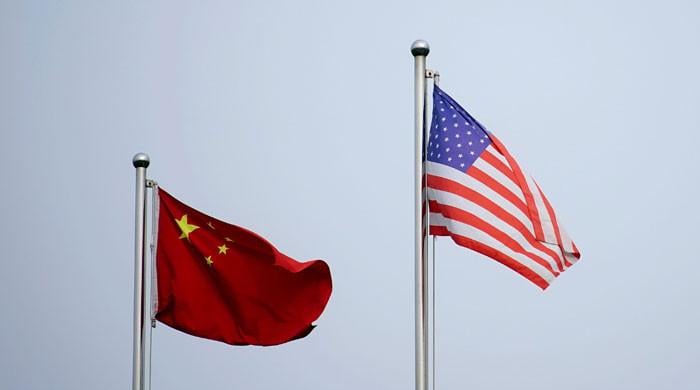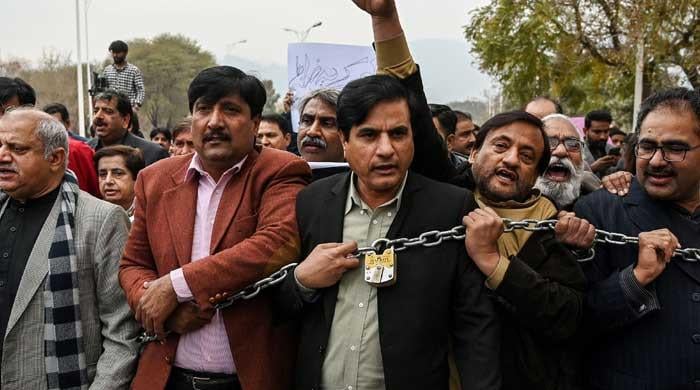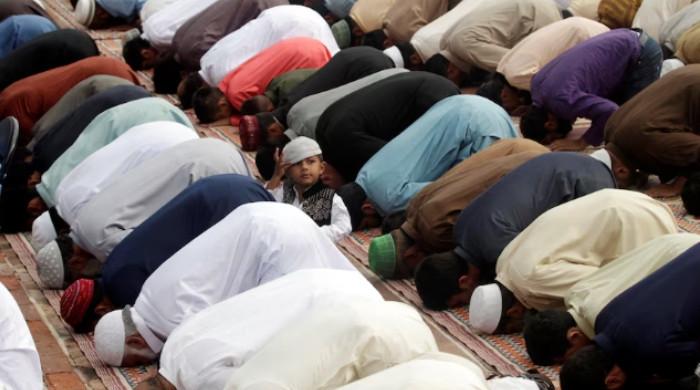Stray musings: why did ordinary Pakistanis turn into a gouging mob? (Part I)
How was the mob at Minar-e-Pakistan able to entirely avoid the local cultural landscape with its deep offerings of decency
September 03, 2021

Coming at the heels of the Minar-e-Pakistan ‘incident’, the prime minister’s recent lament that English medium schools are creating a class of individuals disconnected from their cultural moorings calls for some stray musings.
How was the mob at the Minar able to entirely avoid the local cultural landscape with its deep offerings of decency? They most likely did not attend elite English medium schools. What caused their severance from restraints, religious or other, that ought to have shielded the trapped woman? Even a Tik-Tokker. How does one begin to understand the reactions splashed across electronic, print and social media platforms that rapidly transformed the hapless tossed around, disrobed body of the molested woman into an attention-seeking conspirator against Pakistan?
Soon enough, the woman had descended in the narrative of the social media rabble to the rank of a ‘fahisha’. Highly-placed Aitchisonian class-fellows sheltered behind the cover of ‘forwarded as received’ posts to ask why anyone should be concerned about what had happened to a ‘tawaif’.
When I protested, one of my childhood friends called me ‘anti-Pakistan and anti-Islam’. He was not smiling. Another, I found out, wanted to report me to some agency. Any agency. ‘You have gone all wrong,’ he told me in disgust. He had been noting my ‘liberal’ reactions for a while.
Many others on WhatsApp groups, mature highly educated men with much exposure to the world at levels of considerable success, were content to move on. ‘The boys must be punished but the woman asked for it.’ There was little concern about the genealogy of the Minar incident. Why had a random set of ordinary Pakistanis turned into a gouging mob? What constituted the chord of empathy that seemed to exist between the mob and my friends?
The prime minister recalls that when he left Pakistan for further studies in England, he was little more than a brown sahib, having attended Aitchison College that was a colonial project meant to co-opt the local elite as collaborators. This was a project that had survived with little change of purpose right down to his days as a student. Perhaps a little bit of the autobiographical can be excused in an attempt to place the prime minister’s anecdotal recollections in context. A moving piece in this newspaper a few days ago by friend Feisal Naqvi on his father’s passing away (‘In memoriam: Syed Afzel Hussain Naqvi’, August 26) has acted as a fillip to memory and given courage to talk about some of the dear departed.
We can return to Aitchison and others of its kind later. What the vast majority are going through or might have gone through is far more important. How does anyone come to be somewhat educated?
My father grew up as one of the vast majority. The nearest secondary school was an eight-mile trek on foot from his village in the barren, roadless outskirts of the Potohar. That was ninety years ago.
They sat on the floor in the classroom. That did not matter much. Their teacher Master Dina Nath clearly enjoyed the cadences and the wisdom embedded in Saadi’s Gulistan. My father retained the Persian till the very end. They did mathematics too. English was hard and appeared to be of little use, given the futures they were expected to live. The Holy Quran was taught at the village mosque. The evenings were spent listening to the bards bellowing Mian Mohammad Bakhsh’s Saiful Malook.
The ladies, Muslim and Hindu or Sikh, would tell the children about the local pir sahib’s miracle cures and other sundry blessings. It was a simple life woven around faith and a moral code rooted in respect that transcended religion.
Years later, things had changed. I was by then a student at Aitchison College in Lahore and my father was a prominent lawyer.
A remarkable journey across space, time and aspiration had earlier landed him as part of the secretarial staff in prime minister Liaquat Ali Khan’s office in Karachi, while studying for a law degree at the S M Law College.
It was permissible to answer examination questions in Urdu. Having witnessed the blood-soaked trail that had ensnared Sukhvinder, the dear friend who walked those eight miles to school with him for years, a quest for spiritual truth, decency and the mystery of high poetry that he had picked up as a child came to nestle at the core of his existence. ‘Sajna vi mar jana,’ he would often hum the Saiful Malook to himself.
After moving to Lahore, in search of his destiny in a pond far bigger than what the district courts of his native Gujjar Khan could provide, he found his path blocked by the English language. While he could write English reasonably and understand it well enough, the speaking of it was another matter. This was nearly the hardest battle he fought in life. Countless hours spent reading English newspaper editorials out aloud before friends who had gone to English medium schools ended in defeat.
He was advised to return to where he belonged more often than he ever cared to recall later. It took five years. He stayed and won. Thousands like him gave up, defeated by a language they could not come to pronounce without betraying their provenance.
My father’s story of struggle and success after Independence and Partition was the story of an entire generation. Our next-door neighbours were Justice Fazle Ghani Khan and the painter and politician Hanif Ramay. Khan Sahib had immigrated from Rampur and Ramay Sahib had grown up in inner Lahore. Neither had a particularly privileged upbringing. Each was devoted to his own quest for spiritual truth and decency framed by poetry.
Our contiguous homes flowed with a life deeply rooted in a vast cultural landscape. Ghalib, Iqbal and Josh spoke to them, and us – the children. Reflecting on the message of the Holy Quran was key to their existence. Ramay Sahib saw a deeply egalitarian message in the Holy Book. My father had reached the same conclusion under the influence of Ghulam Ahmed Pervaiz Sahib. He would turn to me, in Iqbal's Persian: 'Kus dar jehan muhtaj e kus na-bashad, nuqta e shara e mubeen een ast o bus.'
Sunday mornings were often spent at the Tulu-e-Islam centre in Lahore. Pervaiz Sahib would commence his weekly vivisection of Maudoodi Sahib’s latest offering, ‘Mausoof ne farmaeyah hai …’ and take us on a grand journey through Iqbal, the not-to-be-named Marx and his linguistic creativity with the text of the holy book.
Back in the neighbourhood, Ramay Sahib would be painting away curvaceous women, many of the sketches appearing as cover pages of Faiz Sahib’s collections of poems, and deploying his signature calligraphy of sacred texts and names on canvas after canvas. The spiritual clearly had a sensuous core.
In his fifties, my father decided to seek fluency in Arabic. This resulted in a deluge of Arabic texts, including modern fiction and poetry, along with language teaching cassettes entering our home. Soon enough, he would read aloud the Holy Quran and translate as he went along. Sounds of ‘wah wah’ would emanate from his study as he paced around, Ghalib’s diwan, Iqbal’s kuliyat or the Holy Quran in his respectful hands. He was equally intent on making up for lost time with the English language, that he had more than vanquished. A question by a child would halt him. Talk would suddenly turn to Russell or his favourite Will Durant. He would reach out into the depths of his massive library. ‘Read aloud,’ he would command while handing me a text.
The mothers were equally fastidious beings – one in her Rampuri gharara, the others often in their saris. Mrs Ramay was a writer herself. My mother had gained a graduate degree in botany and was an aspiring painter. She had endless stories to tell of the poise of Dr Nazir and Dr Ajmal and their crowd through the 1960s at the Punjab University and Government College.
At some point, Mrs Ramay introduced my mother to Wasif Ali Wasif Sahib’s circle. I naturally went along. This was a world very different from that of Pervaiz Sahib’s. The ‘khirqa’ was based out of a small residence in a low-income area. It met a couple of times a week at various residences. The writer duo Ashfaq Ahmed and Bano Qudsia, along with Ramay Sahib, were the eloquent supplicant-interlocutors at the feet of the Master.
The conversation, never less than scintillating, revolved around the theme of contentment. Wasif Sahib’s key message resounded: The soul is brought peace by the paths we open for others.
To be continued.
The writer is an advocate of the Supreme Court of Pakistan. He tweets @salmanAraja and can be reached on [email protected]
This article originally appeared in the September 3 edition of The News. It can be accessed here.











